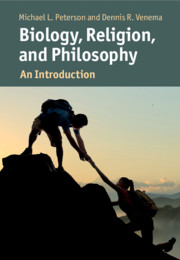Book contents
- Biology, Religion, and Philosophy
- Cambridge Introductions to Philosophy and Biology
- Biology, Religion, and Philosophy
- Copyright page
- Dedication
- Contents
- Acknowledgments
- Introduction
- Part I General Issues
- 1 Science, Biology, and Religion
- 2 The Origin and Nature of Life
- 3 The Question of Design in Living Systems
- 4 Biology and the Problem of Natural Evil
- 5 Progress, Purpose, and Providence
- Part II Religion and Human Biology
- Glossary
- Further Reading
- Index
2 - The Origin and Nature of Life
from Part I - General Issues
Published online by Cambridge University Press: 25 March 2021
- Biology, Religion, and Philosophy
- Cambridge Introductions to Philosophy and Biology
- Biology, Religion, and Philosophy
- Copyright page
- Dedication
- Contents
- Acknowledgments
- Introduction
- Part I General Issues
- 1 Science, Biology, and Religion
- 2 The Origin and Nature of Life
- 3 The Question of Design in Living Systems
- 4 Biology and the Problem of Natural Evil
- 5 Progress, Purpose, and Providence
- Part II Religion and Human Biology
- Glossary
- Further Reading
- Index
Summary
Life has long been thought to be a special quality that distinguishes entities that possess it from entities that are dead or inert. And life has always been fundamental to religious and spiritual traditions. Indeed, the very term “spiritual” is derived from Latin spiritus for breath – and other languages such as Greek (pneuma), Hebrew (ruach), and Sanskrit (atman) contain words variously translated as “spirit” or “breath” or “soul.” However, life is also fundamental to the science of biology. Indeed, bios in classical Greek means “life” – physical life – and is the root of the term “biology.” For centuries, it was commonly accepted, in religion and general society, that life was a special factor somehow distinct from but animating the physical organism. However, in the early years of modern biology, a purely physical basis for life was proposed – a position that was quite controversial, particularly because it had important, ostensibly adverse implications for religious and spiritual traditions.
- Type
- Chapter
- Information
- Biology, Religion, and PhilosophyAn Introduction, pp. 32 - 56Publisher: Cambridge University PressPrint publication year: 2021



